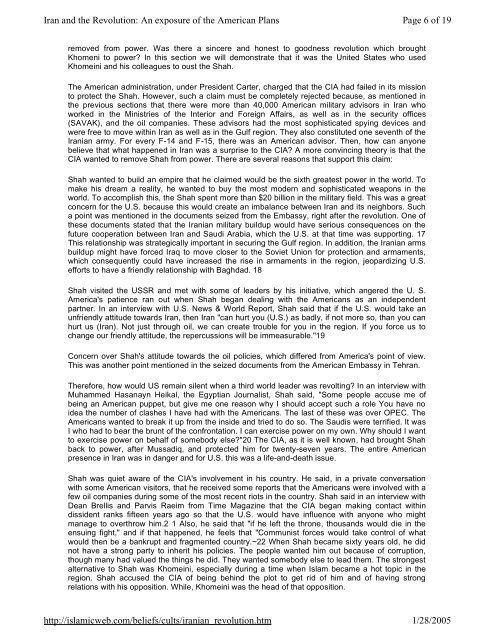Collection Of Articles (Refuting Shia) - Enjoy Islam
Collection Of Articles (Refuting Shia) - Enjoy Islam
Collection Of Articles (Refuting Shia) - Enjoy Islam
Create successful ePaper yourself
Turn your PDF publications into a flip-book with our unique Google optimized e-Paper software.
Iran and the Revolution: An exposure of the American Plans<br />
Page 6 of 19<br />
removed from power. Was there a sincere and honest to goodness revolution which brought<br />
Khomeni to power In this section we will demonstrate that it was the United States who used<br />
Khomeini and his colleagues to oust the Shah.<br />
The American administration, under President Carter, charged that the CIA had failed in its mission<br />
to protect the Shah. However, such a claim must be completely rejected because, as mentioned in<br />
the previous sections that there were more than 40,000 American military advisors in Iran who<br />
worked in the Ministries of the Interior and Foreign Affairs, as well as in the security offices<br />
(SAVAK), and the oil companies. These advisors had the most sophisticated spying devices and<br />
were free to move within Iran as well as in the Gulf region. They also constituted one seventh of the<br />
Iranian army. For every F-14 and F-15, there was an American advisor. Then, how can anyone<br />
believe that what happened in Iran was a surprise to the CIA A more convincing theory is that the<br />
CIA wanted to remove Shah from power. There are several reasons that support this claim:<br />
Shah wanted to build an empire that he claimed would be the sixth greatest power in the world. To<br />
make his dream a reality, he wanted to buy the most modern and sophisticated weapons in the<br />
world. To accomplish this, the Shah spent more than $20 billion in the military field. This was a great<br />
concern for the U.S. because this would create an imbalance between Iran and its neighbors. Such<br />
a point was mentioned in the documents seized from the Embassy, right after the revolution. One of<br />
these documents stated that the Iranian military buildup would have serious consequences on the<br />
future cooperation between Iran and Saudi Arabia, which the U.S. at that time was supporting. 17<br />
This relationship was strategically important in securing the Gulf region. In addition, the Iranian arms<br />
buildup might have forced Iraq to move closer to the Soviet Union for protection and armaments,<br />
which consequently could have increased the rise in armaments in the region, jeopardizing U.S.<br />
efforts to have a friendly relationship with Baghdad. 18<br />
Shah visited the USSR and met with some of leaders by his initiative, which angered the U. S.<br />
America's patience ran out when Shah began dealing with the Americans as an independent<br />
partner. In an interview with U.S. News & World Report, Shah said that if the U.S. would take an<br />
unfriendly attitude towards Iran, then Iran "can hurt you (U.S.) as badly, if not more so, than you can<br />
hurt us (Iran). Not just through oil, we can create trouble for you in the region. If you force us to<br />
change our friendly attitude, the repercussions will be immeasurable."19<br />
Concern over Shah's attitude towards the oil policies, which differed from America's point of view.<br />
This was another point mentioned in the seized documents from the American Embassy in Tehran.<br />
Therefore, how would US remain silent when a third world leader was revolting In an interview with<br />
Muhammed Hasanayn Heikal, the Egyptian Journalist, Shah said, "Some people accuse me of<br />
being an American puppet, but give me one reason why I should accept such a role You have no<br />
idea the number of clashes I have had with the Americans. The last of these was over OPEC. The<br />
Americans wanted to break it up from the inside and tried to do so. The Saudis were terrified. It was<br />
I who had to bear the brunt of the confrontation. I can exercise power on my own. Why should I want<br />
to exercise power on behalf of somebody else"20 The CIA, as it is well known, had brought Shah<br />
back to power, after Mussadiq, and protected him for twenty-seven years. The entire American<br />
presence in Iran was in danger and for U.S. this was a life-and-death issue.<br />
Shah was quiet aware of the CIA's involvement in his country. He said, in a private conversation<br />
with some American visitors, that he received some reports that the Americans were involved with a<br />
few oil companies during some of the most recent riots in the country. Shah said in an interview with<br />
Dean Brellis and Parvis Raeim from Time Magazine that the CIA began making contact within<br />
dissident ranks fifteen years ago so that the U.S. would have influence with anyone who might<br />
manage to overthrow him.2 1 Also, he said that "if he left the throne, thousands would die in the<br />
ensuing fight," and if that happened, he feels that "Communist forces would take control of what<br />
would then be a bankrupt and fragmented country.~22 When Shah became sixty years old, he did<br />
not have a strong party to inherit his policies. The people wanted him out because of corruption,<br />
though many had valued the things he did. They wanted somebody else to lead them. The strongest<br />
alternative to Shah was Khomeini, especially during a time when <strong>Islam</strong> became a hot topic in the<br />
region. Shah accused the CIA of being behind the plot to get rid of him and of having strong<br />
relations with his opposition. While, Khomeini was the head of that opposition.<br />
http://islamicweb.com/beliefs/cults/iranian_revolution.htm<br />
1/28/2005
















